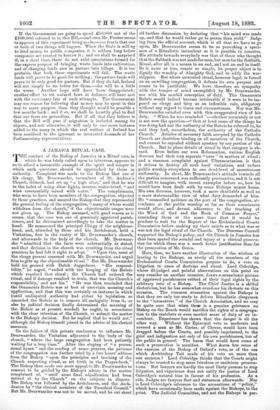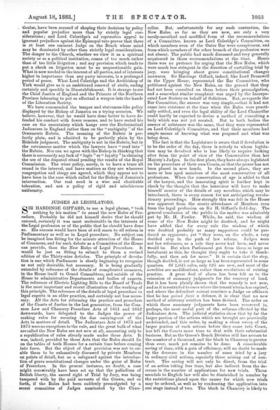A JAMAICA RITUAL CASE.
TIIE conduct of the Bishop of Jamaica in a Ritual case, in which he was lately called upon to intervene, appears to us to afford a favourable example of the spirit and temper in
which such questions should be approached by those in authority. Complaint was made to the Bishop that one of his clergy, Mr. Deurwaarder, incumbent of St. Andrew's Church, Gilnock, had set up " a high altar," and that he was in the habit of using altar lights, incense, wafer-bread, " and wine ceremonially mixed with water." The complainants, who seem to have been members of the congregation, objected to these practices, and assured the Bishop that they represented the general feeling of the congregation, " many of whom would withdraw from the church," if the objectionable usages were not given up. The Bishop assumed, with good reason as it seems, that the case was one of genuinely aggrieved parish- ioners, and he determined accordingly to take the matter in hand. He summoned the principal Clergy of the neighbour- hood, and, attended by these and his Archdeacon, held a Visitation, first in the vestry of Mr. Deurwaarder's church, and afterwards in the body of the church. Mr. Deurwaar- der " admitted that the facts were substantially as stated, and that division in the church was resulting from the ritual practices he had felt it right to adopt." " Upon this, most of the clergy present reasoned with Mr. Deurwaarder, and urged him to give up the objectionable ritual." But Mr. Deurwaarder held his ground with Dutch doggedness. "His responsi- bility," he urged, " ended with the keeping of the Rubric which required that ritual ; the Church had ordered the ritual, and if damage resulted to souls, that was the Church's responsibility, and not his." "He was then reminded that the Ornaments Rubric was at best of uncertain meaning and application, and that this was certainly an instance in which (until undisputed authority had either by legislation so amended the Rubric as to remove all ambiguity from it, or else by judicial decision finally determined the meaning of the Rubric as at present worded) he ought, in accordance with the clear intention of the Church, to submit the matter to the Bishop's decision. But he replied that he would not," although the Bishop himself joined in the advice of his clerical assessors.
On the failure of this private conference to influence Mr. Deurwaarder, the Visitation adjourned to the body of the church, " where the large congregation had been patiently waiting for a long time." After the singing of "a proces- sional hymn " and the reading of some prayers, the patience of the congregation was further tried by a two hours' address from the Bishop " upon the principles and teaching of the Church respecting ritual, as set forth in the Prayer-book." The Bishop then made one more appeal to Mr. Deurwaarder to consent to be guided by the Bishop's advice in the matter complained of, "until some final adjudication had been arrived at by the Church" on the subjects in dispute. The Bishop was followed by the Archdeacon, and the Arch- deacon by " the clerical members of the Parochial Council." But Mr. Deurwaarder was not to be moved, and he cut short
all further discussion by declaring that " his mind was made up, and that he would rather go to prison than yield." Judg- ing from the official account, which is all that we have to go upon, Mr. Deurwaarder seems to be as provoking a speci- men of a Ritualistic incumbent as it is possible to conceive. His attitude towards everybody was that of those who thought that the Sabbath was not made for man, but man for the Sabbath. Ritual, after all, is a means to an end, and not an end in itself. Be it more or less, ornate or simple, its proper object is to dignify the worship of Almighty God, and to edify the wor- shippers. But where unwonted ritual, however legal, is forced on an unwilling congregation, it defeats its own purpose and ceases to be justifiable. We have therefore no sympathy with the temper of mind exemplified by Mr. Deurwaarder, nor with his morbid conception of duty. The Ornaments Rubric would indeed become intolerable if it were to be im- posed on clergy and laity as an inflexible rule, obligatory without any regard to times and circumstances. Nor was Mr. Deurwaarder satisfied even with this exaggerated view of his duty. " When he was reminded "—whether- accurately or not is not now the question—" that at least some of the things he was doing had not the authority of the Rubric he referred to, he said they had, nevertheless, the authority of the Catholic Church." Articles of necessary faith accepted by the Catholic Church are doubtless binding on all members of the Church, and cannot be repealed without apostasy by any portion of the Church. But to place details of ritual in that category is ab- surd. Even before our own Reformation, various English dioceses had their own separate " uses " in matters of ritual ; and a common complaint against Ultramontanism is that it strives to destroy all such local variations, and reduce public worship everywhere to one dead-level of monotonous uniformity. In short, Mr. Deurwaarder's attitude towards all the parties concerned was sufficiently provocative, and it is not difficult to imagine, with recent examples before us, how he would have been dealt with by some Bishops nearer home. His own diocesan, however, took a more charitable as well as a more statesmanlike view of what duty demanded of him. He " counselled patience on the part of the congregation, at- tendance at the public worship as far as their consciences would allow, and devout adherence to the teaching of the Word of God and the Book of Common Prayer," reminding them at the same time that it would be prudent to wait for the Report of the Ecclesiastical Courts Commission before making up their minds as to what was or was not the legal ritual of the Church. The Diocesan Council supported the Bishop's policy, and the Church in Jamaica has thus been spared the scandal and injury of a clerical prosecu- tion for which there was a much better justification than for the prosecution of Mr. Green.
Here, then, we have another illustration of the wisdom of leaving to the Bishops, as nearly all the members of the Ecclesiastical Courts Commission propose to do, a veto on litigation in cases of doctrine and ritual. Lord Coleridge, whose ill-judged and painful observations on this point we may consider on another occasion, draws a sensational picture of aggrieved parishioners robbed of their legal rights by the arbitrary veto of a Bishop. The Chief Justice is a skilful rhetorician, but he has somewhat overdone his rhetoric on this occasion. The common accusation against the Bishops is that they are only too ready to deliver Ritualistic clergymen to the " tormentors " of the Church Association, and we may be quite sure that when them is a genuine grievance no Bishop on the Bench would sacrifice the rights of a congrega- tion to the crotchets or even morbid sense of duty of an in- cumbent. Experience has shown that the danger is all the other way. Without the Episcopal veto so moderate and revered a man as Mr. Carter, of Clewer, would have been dragged before the Courts, and possibly imprisoned, to the grief and indignation not only of his own parishioners, but of the public in general. The harm that would have come of such a prosecution is manifest. What harm has come of the exercise of the Bishop of Oxford's veto, or of the use which Archbishop Tait made of his veto on more than one occasion 4 Lord Coleridge thinks that the Courts might always be trusted to stop mere frivolous or malicious prosecu- tions. But lawyers are hardly the most likely persons to stop litigation, and experience does not ratify the justice of Lord Coleridge's natural bias in favour of his profession. As a rule, Judges are lawyers first and statesmen afterwards. Nor is Lord Coleridge's reference to the accusations of "policy," which have occasionally been made against the Bishops, to the point. The Judicial Committee, and not the Bishops in parr
ticular, have been accused of shaping their decisions by policy and popular prejudice more than by strictly legal con- siderations ; and Lord Coleridge's ad captandum appeal to ignorant prejudices against the Episcopal veto proves that there is at least one eminent Judge on the Bench whose mind may be dominated by other than strictly legal considerations. The danger to the Church, whether we view it as a spiritual society or as a political institution, comes of too much rather than of too little litigation ; and any provision which tends to pat a check on litigation must be an unquestionable gain. What is now needed in the interest of all parties, and of interests higher in importance than any party interests, is a prolonged period of peace. What Lord Coleridge and the Archbishop of York would give us is an embittered renewal of strife, ending certainly and speedily in Disestablishment. It is strange to see the Chief Justice of England and the Primate of the Northern Province labouring to put so effectual a weapon into the hands of the Liberation Society. We have commended the temper and statesman-like policy displayed by the Bishop of Jamaica on a trying occasion. We believe, however, that he would have done better to have de- fended his conduct with fewer reasons, and to have rested his case on the uncertainty which hangs over the Ecclesiastical Judicature in England rather than on the "ambiguity " of the Ornaments Rubric. The meaning of the Rubric is per- fectly plain, and is admitted to be perfectly plain by the Ridsdale judgment. The ambiguity is not in the Rubric, but in the extraneous matter which the lawyers have read into " the Rubric. Nor can we agree with the Bishop in thinking that there is necessarily any lack of " logic " or " loyalty " in claiming the use of the disputed ritual pending the results of the Royal Commission. The wiser policy, surely, is to have a truce all round in the interval, and leave matters as they are wherever congregation and clergy are agreed, which they appear not to have been in the case which called for the Bishop of Jamaica's
intervention. Our real need is a wise and charitable toleration, and not a policy of rigid and mischievous uniformity.



































 Previous page
Previous page